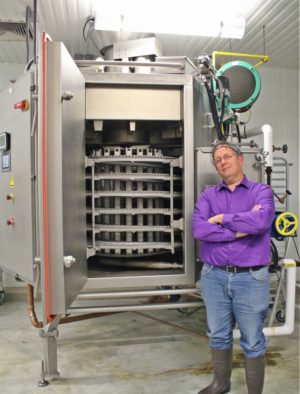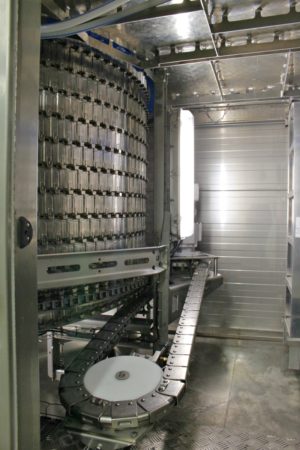Food Processing Innovation Center a ‘leasable factory’ for food producers
By Zeke Jennings | Managing Editor
A new facility at Michigan State University offers some unique opportunities for food producers.
The Food Processing and Innovation Center (FPIC) opened in 2018. The facility offers a wide range of equipment and the ability to experiment and produce ready-to-sell, regulated products. FPIC Director Matt Birbeck describes the facility as “a leasable factory.”
“Not only can (companies) come in here and do proof of concept, they can do full runs and sell into the marketplace,” Birbeck said. “That is the clever thing because you can recover costs.”
The ability to make ready-to-sell products on site stems from being licensed with federal and state inspection departments, as well as an in-house team well versed in all food safety regulations and compliance measures. Facility and Operations Manager Jason Hofman and his staff have the ability to create a food safety plan on their own or, in the case of larger producers, work with their compliance team.

“We do have a federal grant of inspection for meat, poultry and egg products, so we can produce sellable products out of this facility,” Hofman said. “That’s probably the biggest thing that makes us different from everybody else.
“We have a license with the (Michigan) Department of Agriculture and Rural Development, which means we also fall under the jurisdiction of the FDA, so we’re registered with the FDA.”
The original goal
With MSU Extension’s commitment to support the food and agricultural industry, the FPIC is part of MSU Product Center that provide a complete suite of services for stage 1 start-up ventures, to large established stage 3 companies.
The culmination of these services saw the need to create the FPIC to enhance and mitigate the risk of innovation and expansion. Targeted primarily for these mid-sized, stage 2 companies, it’s also an invaluable asset for large stage 3 companies looking to find R&D facilities with different types of processing and packaging equipment. Companies that are well established and significant brand following and desire to grow often lack the resources such as in house research and development capabilities. Birbeck cited two Michigan-based companies — Grand Traverse Pie Company and Slows Bar BQ — as typical companies that require the FPIC to be part of their strategic growth.
“The notion for the FPIC was born out of that. These stage 1 companies had access to incubator kitchens, so they didn’t really need it. Stage 3 companies have their own R&D plants and, therefore, had options,” Birbeck said. “But these stage 2 companies had nothing.”
“How are you going to be competitive in the marketplace in the future? How are you going to grow your business?” Birbeck said he would ask food producers. “They would say product development and moving pieces. … It was all very well for them telling us what they were planning to do, but there was no way or place for them to do it.”
The FPIC is the first of its kind that provides an R&D facility with all the access to sophisticated equipment plus the universities resources, but with the additional ability to be sell products produced there to recapture costs and mitigate risk of investment of expansion for companies.
Big three machines
While the facility has drawn plenty of interest from the original target companies, the staff learned quickly that larger companies are chomping at the

bit as well. Their interest stems from FPIC’s unique collection of equipment. Both Birbeck and Hofman cited three large items that stand out to processors.
“The three biggest pieces we have are the spiral oven, spiral freezer and retort machine,” Birbeck said. “They’re very expensive pieces. You don’t just run out and pick one up. … The stage 3 companies — the big boys — really like the idea because it is a facility that doesn’t have the same things as their own R&D plant. With ever-changing worlds and ever-changing markets and innovations, they view the FPIC as being a very unique in that they can come here, make product lines with typical pieces of equipment that their own R&D facilities don’t have.”
Thus far, Birbeck said FPIC clientele is an even split between stage 2 and stage 3 companies.
Compliance
Both Birbeck and Hofman said the ability to create sellable products is what sets the FPIC apart (although some of their clientele is just looking to experiment). The compliance and regulation aspect requires a lot of attention. Hofman and Tina Conklin, director, accelerated growth services, are licensed in numerous areas of food safety.
“We have a small team of people that works on food safety issues. The regulations are constantly, constantly changing. It’s a challenge,” Hofman said. “If we have six or 10 clients in a calendar year, we potentially have to write six or 10 different food safety systems. We may use it one or two times and never use it again, so it’s a constant drafting of food safety documents.”
Hofman said prospective clients are often surprised at what the FPIC is capable of doing.
“We have clients that come in and say, ‘Well, you’re a co-packer so you have to go through a third party. We have to audit your facility to make sure you’re acceptable to produce product for us,’” Hofman said. “I throw at them, ‘Well, you own the process; I’m going to help you develop the process.’ If there is something that has to be met, then we have to have that conversation before we ever get into production. That’s when the light bulb goes off for them and realize this is different.”
Birbeck said word of mouth within the industry is spreading quickly, more so than they anticipated.
“We did a big open house in July (2018), but our marketing is being done very verbally and we’re getting known,” Birbeck said. “The scary thing is we’re getting approached very quickly. I’m not saying there’s not room for other customers, but it is filling much quicker than we anticipated.”







